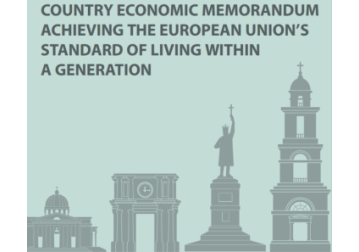
Moldova, if reforms are implemented, can achieve economic growth above 5% in the medium term and reach convergence with the EU average income level within three decades – WB
This is stated in the Moldova Country Economic Memorandum, presented by the World Bank and the Ministry of Economic Development and Digitalization of Moldova, which outlines the main reforms needed to accelerate Moldova's economic growth and achieve convergence with the EU average income level. The report, titled “Achieving European Union’s Standard of Living within a Generation,” also highlights Moldova's achievements, including a tenfold increase in GDP per capita since 2002 and a significant reduction in poverty. The report notes that despite this progress, Moldova faces challenges such as low productivity in non-agricultural sectors, overdependence on declining remittances, and demographic changes characterized by a shrinking and aging population, and stresses the urgency of Moldova's transition to a new growth model. According to the report's recommendations, in order to achieve sustainable growth and reach EU living standards, the country needs to focus on increasing productivity, accelerating public investment while improving competitiveness, reforming public institutions and promoting job creation in various sectors. “Moldova has made significant progress on its economic path, transforming from a low-income country to an upper-middle-income country. Targeted reforms are necessary for Moldova to ensure the sustainability of this growth, as well as to continue on the path of EU integration,” said World Bank Group Country Director for Moldova, Inguna Dobraja. According to her, the World Bank's Country Economic Memorandum outlines these reforms, identifying key priorities for advancing a long-term agenda to strengthen a more competitive, sustainable economy with a focus on private sector development. The Economic Memorandum is accompanied by a complementary report, “Exploring Pathways to Moldova's Manufacturing Sector Development through Automotive and Pharmaceutical Global Value Chains,” which presents a value chain analysis and shows how Moldova can modernize its industrial base using two illustrative but different examples, such as the automotive and pharmaceutical sectors. The World Bank emphasizes that consistent implementation of these reforms is essential for Moldova's socio-economic transformation and sustainable growth. The WB experts point out that the path to EU integration offers Moldova ample opportunities to unlock its growth potential and bring the economy in line with EU socio-economic standards. The WB Moldova Country Economic Memorandum states that policy and institutional reforms that create a new growth model based on productivity and competitiveness of the private sector can raise Moldova's income to the EU average within a generation. The report uses the World Bank's Long-Term Growth Model to estimate Moldova's growth path to 2070 under current trends and reform scenarios in various policy areas comparable to achievements in other countries in the region. The simulation shows that reforms that increase the productivity of private firms, improve the quality of infrastructure services, and upgrade the skills of the next generation labor force will raise economic growth by more than 5 percent in the medium term, so that Moldova achieves convergence with the EU average income level within three decades. This scenario is based on reforms that allow Moldova to achieve an average level of total factor productivity growth comparable to Slovakia or Lithuania in 2000-2019 by increasing public investment and improving secondary education. This strong reform incentive, aimed at increasing domestic private sector productivity, is also expected to help reverse out-migration trends by making Moldova a more attractive place to work, gradually raising labor force participation rates. The reforms are expected to boost Moldova's growth by an additional 1.4 percentage points by 2030 and maintain a 1 percentage point higher long-term growth rate compared to current trends and policies (i.e., the baseline). In particular, the report focuses on reforms that increase private sector productivity and investment in public infrastructure, which have the strongest impact on medium-term growth. Since 1992, the World Bank has committed more than $2.1 billion to more than 70 operations in Moldova, covering areas such as regulatory reform and business development, modernization of public services, tax administration, cadastre, education, roads, health, emergency response and risk management, agriculture, water, sanitation, and energy. As of September 2024, the World Bank's 14 active operations in Moldova are helping to improve the lives of tens of thousands of people across the country, including students, farmers, people with disabilities, and refugees from Ukraine. The International Finance Corporation (IFC) and the Multilateral Investment Guarantee Agency (MIGA), both part of the World Bank Group, are currently engaged in financial sector projects, private and public sector consulting, and risk insurance. //25.11.2024 - InfoMarket.







